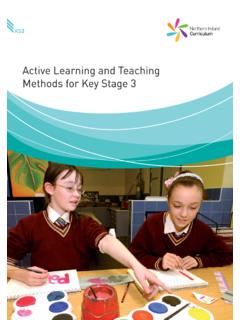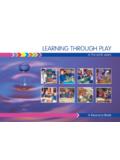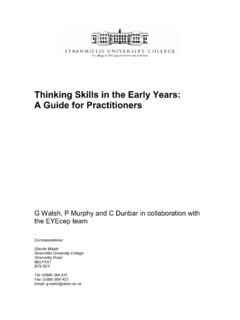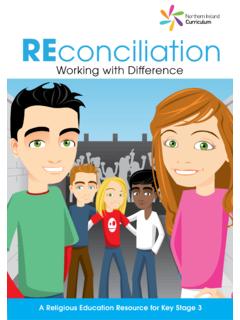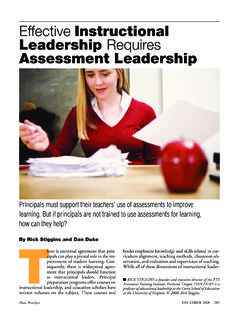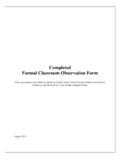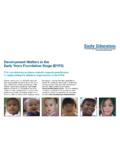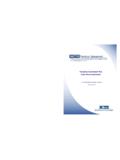Transcription of Guidance on Assessment in the Primary School
1 Guidance on Assessmentin the Primary SchoolA CCEA Publication 2013 Front Cover Photograph: Thinkstock / HemeraIntroduction 1 Aims 2 Section 1:What is Assessment ? 3 Section 2: Developing Quality Assessment Policy and Planning at Whole- School Level 9 Section 3: Developing Quality Assessment Approaches in Primary Schools 15 Section 4: The Areas of learning and Thinking Skills and Personal Capabilities 21 Section 5: Effective Use of Data and Target Setting 39 Section 6: Internal Standardisation in the Primary School 43 Section 7: Effective Reporting 47 References 51 Appendix 1: The Big Picture of the Curriculum 53 Appendix 2: The Big Picture of Assessment and Reporting 54 Contents1 Assessment can affect pupils motivation to learn. It plays a crucial role in improving learning and raising standards. Stiggins, 2008 What is taught in schools is often determined by what is assessed, particularly where the Assessment results are used for high stakes purposes.
2 The nature and content of the assessments could determine the nature of teaching and learning and may limit the use of more innovative modes of teaching (Burkhardt, 1987; NCETM, 2008). Assessment is also a crucial aspect in the implementation of the key competences (European Commission, 2012b). Assessment is a key professional competency (GTCNI, 2011) that requires teachers to: use a range of Assessment strategies to assess pupils learning ; appreciate its uses and limitations; make evidence-based Assessment against relevant criteria; involve pupils in assessing their learning and performance; assess pupil performance against relevant benchmarking data; understand the relationship between Assessment , setting pupil targets and progression; use Assessment information to make teaching more effective; and collaborate with others to make Assessment more effective at the classroom and whole- School Northern Ireland Curriculum sets out a flexible framework of knowledge, understanding, skills and capabilities, to prepare young people for a rapidly changing world.
3 It aims to: empower young people to develop their potential and to make informed and responsible choices and decisions throughout their lives. The Northern Ireland Curriculum Primary , 2007 Assessment is an integral part of the Northern Ireland Curriculum. It must reflect curriculum requirements to provide constructive, motivating and challenging learning experiences. This enables young people to gauge their own progress and potential and take informed action towards ongoing improvement. Teachers can use a variety of Assessment techniques as part of an integrated approach to teaching, learning , planning and Assessment . When planning Assessment , they should ensure that it is purposeful and fits in well with the work they are teacher s role is central to ensuring quality Assessment within schools (Wyatt-Smith et al.)
4 , 2010). Teachers and schools must have sound knowledge of Assessment and the professional skills to develop and apply this in practice (GTCNI, 2011). Webb defines Assessment literacy as: knowledge about how to assess what students know and can do, interpret the results of these assessments, and apply these results to improve student learning and program effectiveness Webb, 2002 Improving Assessment literacy is essential for developing teachers competency to assess pupils learning . This will help them to be more consistent and understanding in their professional judgements. This Guidance supports principals, vice-principals, Assessment and Key Stage co-ordinators, and teachers in planning for Assessment at individual pupil, class, and whole- School level and at the end of each phase: Foundation Stage, Key Stage 1 and Key Stage 2.
5 This Guidance aims to encourage and promote: effective and manageable Assessment planning, marking, judgements and standard-setting; pupils more active involvement in peer and self- Assessment , including setting and reviewing their own learning targets and identifying areas for development; the constructive use of feedback to improve learning ; the effective use of Assessment data to inform teaching and learning for tracking progress and to promote improvement (DENI, 2009); and the development of coherent and manageable Assessment practices that promote equity and fairness for all individuals and groups and reflect the Northern Ireland Curriculum and School improvement strategies (ibid.).This Guidance focuses on continuing professional development connected with School Performance Review and Staff Development (PRSD) programmes (Regional Training Unit (RTU, 2005)).
6 This may help teachers to become more competent practitioners of quality is Assessment ?SECTION014 What Is Assessment ?For the purposes of this Guidance , we define Assessment as the systematic collection, interpretation and use of information to give a deeper appreciation of what pupils know and understand, their skills and personal capabilities, and what their learning experiences enable them to of AssessmentThe following five principles underpin quality Assessment . It should: be complementary to and supportive of learning ; be valid and reliable; be fit for purpose and manageable; support teachers professional judgement; and support Purposes of Assessment Assessment can serve different purposes according to how we use the information it provides (Teaching and learning Research Programme (TLRP), 2010).
7 For more information, please refer to Appendix 2: The Big Picture of Assessment and Reporting. Assessment has four main purposes:1. Diagnostic AssessmentDiagnostic Assessment identifies strengths and areas for improvement and informs the next steps. It normally takes place at the beginning of a learning programme. It involves the teacher working closely with the pupil to identify their strengths and learning needs. Teachers identify the nature of a pupil s learning difficulties and use this information to plan interventions to address the issues discovered. They should then share this information with the pupil to plan the next steps to improve their Formative Assessment ( Assessment for learning or AfL) Formative Assessment , often referred to as Assessment for learning (AfL), is part of the everyday teaching and learning process.
8 Teachers gather evidence about a pupil s learning , for example by observing, listening, questioning, discussing and reviewing pupil work. They can then use this evidence to: identify progress and gaps in learning (including individual support needs); set learning goals and success criteria; and provide feedback to pupils. Assessment for learning is the process of seeking and interpreting evidence for use by learners and their teachers to decide where the learners are in their learning , where they need to go and how best to get there. Assessment Reform Group (ARG), 2002 Guidance ON Assessment IN THE Primary SCHOOL5 Teachers use AfL to enable pupils to build on their learning . AfL focuses on how pupils can improve their learning . The continuous process of dialogue and interaction between teachers, pupils and peers is an essential part of AfL.
9 It involves peer and self- Assessment (ARG, 2008; Black and Wiliam, 2009). Ten guiding principles underpin AfL. It should: be part of effective planning; focus on how pupils learn; be central to classroom practice; be a key professional skill; be sensitive and constructive; foster motivation; promote understanding of goals and criteria; help learners know how to improve; develop the capacity for self- Assessment ; and recognise all educational , 2002 Five key AfL strategies support these ten principles in classroom practice: Focus on learning by sharing learning intentions and success criteria with pupils. Effective questioning encourages pupils to think about their learning . Quality formative feedback allows teachers to identify pupils achievements, any gaps in their learning , and areas for further work (what learners have done well and what they should to do to perform better).
10 Scaffolding reflection gives pupils time to reflect on their learning , allowing them to think about what and how they are learning and to adapt their approaches, if necessary, to achieve their goals. Teacher reflection on effectiveness of teaching and learning allows teachers to verify what their pupils have learned. This helps them decide what they may need to teach again in a different way, or how to focus future teaching for learning : A Practical Guide CCEA, 20093. Summative Assessment Summative Assessment gives pupils, parents and teachers valuable information about a pupil s overall performance at a specific point in their learning . It provides information about a pupil s progress in subject knowledge, understanding and Thinking Skills and Personal Capabilities (TSPC). Summative Assessment in the Primary School can occur at different intervals such as weekly, on completion of a topic of work, at the end of each term, or at the end of the year.
